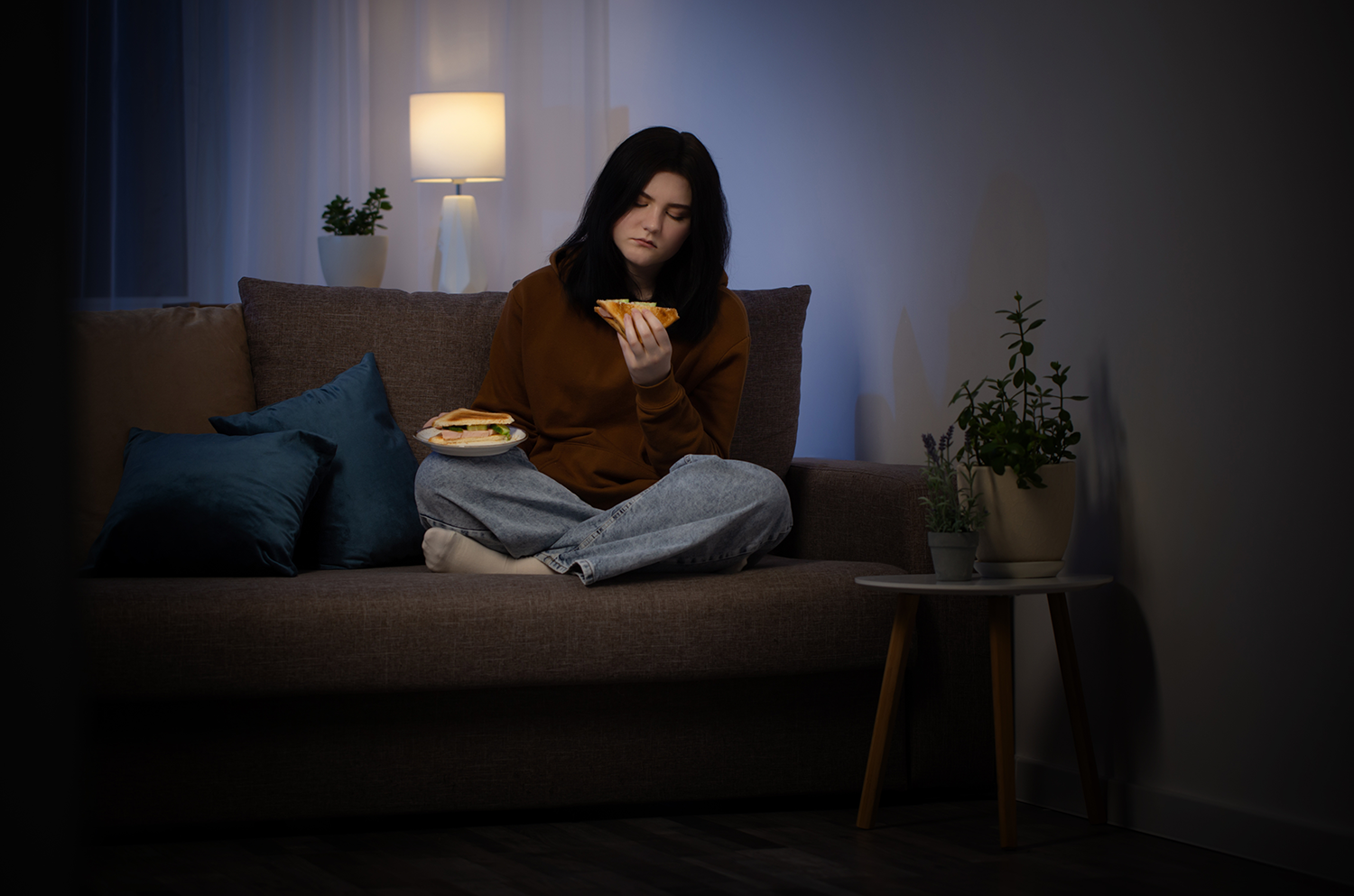How Not to Let Late-Night Snacking Turn into a Nightmare
Each of us faces different challenges across the weight loss journey. For those of us who struggle with cravings or snacking when not hungry, there are two main pitfalls across the 24-hour day.
First, there is the afternoon snack attack, which can strike during that 3 pm energy slump. The other obstacle is snacking later at night after dinner; also known as a “bedtime snack” or a “midnight snack,” these snacks tend to be more of a dessert than anything else.
Let’s dive into some of the very normal reasons many of us succumb to food cravings at night—and what we can do about it.
Reason #1: You’re in the habit of consuming things late at night.
The body gets used to your routine of eating. If you tend to snack at a certain time every night, your body can begin to trigger hunger cues in preparation for the expected eating. The key here is replacing that unhealthy midnight snack with a healthy one.
If you’re genuinely hungry, it’s okay to have a small, nutritious snack (think under 200 calories) at night. Research has shown eating something healthy with high protein at night won’t lead to weight gain in itself, and could even be beneficial when part of a healthy lifestyle that includes exercise. It could even support muscle growth—some studies of active individuals suggested that consuming a protein shake half an hour before bedtime can improve muscle protein metabolism.
Note: It used to be said that eating anything at night, even hours before bedtime, was a one-way ticket to weight gain. However, the body does continue to metabolize food during sleep—although at a slower rate than when we’re awake during the day—and eating at night does not guarantee weight gain.
Reason #2: Your body is starving by night.
Another classic reason we snack at night? Not getting enough calories during the day and our bodies try to play catch-up. This can easily happen on a weight loss journey as we adjust our daily caloric intake to eating healthier and exercising more. Make sure you are consuming enough calories for your daily bodily functions (aka know your Total Daily Energy Expenditure, or TDEE) and are adjusting for increased exercise, if relevant.
Eating smaller, regular meals throughout the day can be one solution. Make sure you are consuming enough fiber and protein to help feel fuller for longer. Remember, what we do during the day can impact our night!
Reason #3: You’re actually thirsty.
Because humans also get water from their food, dehydration can sometimes be disguised as hunger (the body likes to confuse us like that). It’s important to drink water throughout the day to stay hydrated overall. Aim to drink 72 to 104 oz fluids daily (for women and men, respectively).
If you do experience a hunger craving late at night, first drink a full glass of water and see if you’re still hungry. Another option if you’re craving flavor is to drink flavored sparkling water. You could also prepare a nighttime mocktail (such as one made with magnesium supplement powder) as a pre-sleep prep drink.
Reason #4: You’re not getting enough sleep.
We talk a lot about how it’s important to get good quality sleep, especially for someone on a weight loss journey. Studies have shown that a lack of sleep can interfere with your ability to make healthy food choices and even impact your hunger hormones, which sustained over time can lead to overeating and weight gain.
Aim to get between 7-9 hours of sleep per night. Creating a healthy routine with a consistent bedtime, consuming less caffeine and alcohol, and exercising regularly are all science-back ways to improve your sleep hygiene.
Reason #5: You are stressed.
For many people, the evening is the first time all day they have to relax and unwind. The stress we experience (and suppress) all day can finally rear its ugly head in the form of nighttime food cravings.
If this sounds like you, it’s important to prioritize healthy self-care activities. We’re not saying you can’t catch up on your favorite television shows—but try watching with a nice herbal tea or lemon water instead. There are many caffeine-free tea blends available that are specifically designed to help you relax and prepare for sleep. Others may prefer to wind down before bed with some gentle stretching or bedtime yoga.
Another option is to find a pre-bedtime hobby that involves your hands, such as drawing, knitting, or even playing handheld video games. This makes it more difficult for you to mindlessly snack while doing the activity of choice. (We certainly don’t want to get potato chip dust on our nice things!)
Mindfulness Exercise: Urge Surfing
Visualize your cravings and the urge to eat something as waves in the ocean. Waves rise and fall in height as they approach the shore, but they always pass. We can think of food cravings as waves that we know will come but are temporary.
When you feel a food craving coming on, you can engage in “urge surfing.” This is when you “surf” the wave of the craving by engaging with a healthy tool that helps you ignore the urge until it’s passed. Meditation, breathing exercises, or other healthy relaxing activities can help you ride out the craving.
Reason #6: You need something more.
For those struggling to lose weight despite trying to eat healthier and exercising more, it may be a good idea to talk to your healthcare provider. Not only can they help you get to the bottom of your unhealthy habits, but they may also be able to share about prescription medication options that could be right for your situation.
Our Personalized Weight Loss Assessment tool can help you get that conversation started with your provider.
CON-2016-001 5/24

